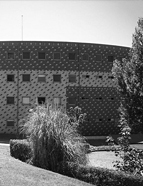

As suggested by the references of the foregoing paragraph, a minimum body of research and teaching areas began to take shape (Archaeology, History of Art, Medieval History, Modern History, Contemporary History), within the scope of the «pre-specializations» (PEs) which, in a context marked by the de facto extinction of the final dissertations, filled the 4th and 5th years until the degrees were re-structured to a four-year duration (1978). Although without such a sequence, to some degree the PEs predicted the History degree variants (Archaeology and History of Art, 1978, divided in 1981) and the subsequent master's degrees (the first were those of Medieval History and Modern History, with first editions in 1983/84).
The second half of the 1970s also saw the resumption of PhDs: Cândido dos Santos and Eugénio dos Santos, in 1977 (Modern History, supervisor Jean Delumeau, who would also become the "directeur de thèse" of João Francisco Marques in 1984 and then be awarded the title of Doctor Honoris Causa by the School); Carlos Alberto Ferreira de Almeida (in History of Art, supervisor José António Ferreira de Almeida), Francisco Fortunato Queirós (in Contemporary History, supervisor António Cruz) and Aurélio de Oliveira (Modern History; supervisor Emmanuel Le Roy Ladurie ( who moved in the meantime to the University of Minho, from where he returned in 1985), all in 1979; and Fernando de Sousa (Contemporary History, supervisor A. H. de Oliveira Marques [1933-2007]), in 1980. From 1978 onwards, the open tenders for extraordinary professors (Humberto Baquero Moreno, Luís de Oliveira Ramos) and the title of "agregado" (Cândido dos Santos, 1979; Eugénio dos Santos, 1980) were also resumed. Thus, when the first Estatuto da Carreira Docente Universitária [Statute of the University Teaching Career] (ECDU) came into force at the end of 1979, the 4th Cluster of the FL/UP had four members qualified to take up the Chair (Baquero Moreno, Oliveira Ramos, Cândido dos Santos and Eugénio dos Santos) and all of them were appointed as such in the Summer of 1981, in a curious coincidence with the departure of some of the avatars of the School's first senior generation from the scene: namely the retirement of António Cruz and Rafael Ávila de Azevedo between July and October of the same year and the death of José António Ferreira de Almeida; in 1985, the new professors would be joined by Carlos Alberto Ferreira de Almeida, Luís Adão da Fonseca, Fernando de Sousa, Aurélio de Oliveira and Francisco Fortunato Queirós.
